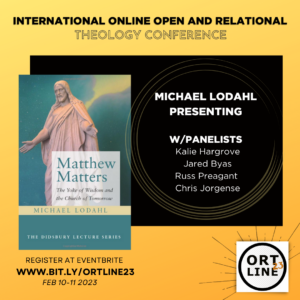What Open and Relational Theology Tells Us About Social Justice
Recently, I took part in a virtual conference discussing works in the field of Open and Relational Theology (ORT). When my friend Mason found out that I had been invited, his response was “I didn’t know you were in the ORT world.”
It is honestly something I don’t talk about much. I was first introduced to ORT through Dr. Thomas Jay Oord and his book God Can’t, which attempts to explain why there is persistent evil in the world. Ultimately, in his conclusion, it comes down to the fact that God’s love is fully uncoercive and, thus, God can’t unilaterally act in a way that removes agency from creation.

In essence, this means there is a lot that God simply cannot do without becoming coercive in their actions. In this case, God can work with creation to affect change, but it is through a partnership with God and the willingness of the creation to bring that change about.
As much as I would like to go into detail about all the theological and metaphysical implications of Dr. Oord’s work, a blog is not the space to do that. If you are interested in reading more, you can purchase his book here.
God’s invitation is to be an active partner, not a passive observer.
With the idea that God’s love is ultimately uncoercive and God cannot unilaterally correct evil in the world, we are left with an elevated level of responsibility on the part of humanity that other theological perspectives do not generally hold. This is one of the reasons I hold to ORT, because I believe it calls for us to join with God’s work to end systemic evils in the world. God’s invitation is to be an active partner, not a passive observer.
One of the major difficulties with joining with God to reverse the effects of evil is how intricate many of our present (and past) evils are built into our current society. White supremacy, queerphobia, colonialism, patriarchal normative, and many others are all evils that exist in our world that ultimately have come about through human freewill. These are much more difficult to change since they are intrinsically connected to the foundations of our society. Just as God could not coercively prevent these systems from developing, God cannot coercively force humanity to end these systems.
This is where we must choose to partner with God in our world. It is not enough to just pray for change. We must take an active part in the work around us and oppose the systems of oppression that sill engulf our society.
Unfortunately, this work is not easy. In fact, engaging in this work often leads to people choosing to actively defend these systems. But this is what it means to when we say “God can’t, so we must.”
Part of the work of Jesus was to give an illustration of what it means to live out God’s will in the world as a human. It means standing in solidarity with all of the marginalized and oppressed groups in our world and speaking against the powers that keep them there. This work led to the eventual execution of Jesus, because systemic evil will always defend itself from Truth.
It is why I believe it is important for us to continue the work of social justice in our world. We are partnering with God in the work of reversing systemic evil that continues to persist in our world. The love of God means God does not force us, so we must make the decision to take an active role in actualizing a new way forward. It means we are responsible for our future and what we do with this life.
Change requires us to be active, because when God can’t, we must.
Black Sacred Music as Spiritual Practice
Rev. Dr. Donald H. Matthews, PhD.
Black Religion is noted for its narrative character. This narrative character is found most profoundly in it music. It is no mistake that Howard Thurman, the most well known of African American Spiritual Masters experienced, researched and wrote about the “Negro” Spiritual. Scholars like W. E. B. Du Bois. Zora Neale Hurston and James Cone based their interpretation of Black Religion as it was found in the Black music of the Spirituals, Blues and Gospel music. This course will seek to help the student gain a deeper understanding of the ways that this music informs the spiritual practice of Black individuals and communities in their quest for Spiritual Wholeness. In engaging the fundamental expressions of this faith through its musical recordings, the written text, in discussion and in meditation, the student will gain a lived experience of its spiritual depth.
We will begin accepting applications on February 15. The deadline for applications is July 15.
If you would like us to notify you when applications are open, as well as receive other updates about the program, please fill out the contact form below:
